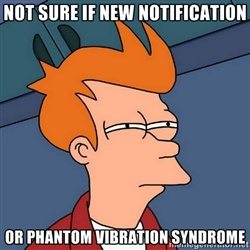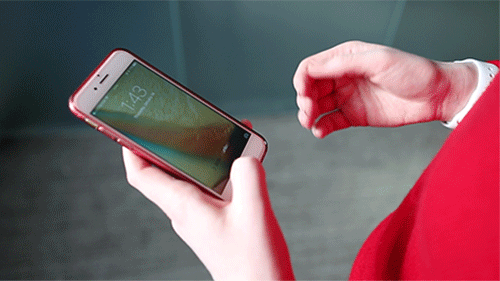Mobile phones are one of the best inventions ever, right? Besides calling and texting you can use different types of apps that make your life easier. But, although we might not realize it, mobile phones are quite addictive. We can almost hear you saying: “Oh, not this again! I know I spend a lot of time playing on my phone!” But even when we don’t use them, we’re still addicted. Think about it: you have your phone in your pocket and you suddenly feel it vibrate but, when you check it, you discover (with disappointment) that no one was calling or texting you and that your brain was actually playing tricks on you. This is called “the phantom vibration syndrome” or, simply, phantom ringing, and is a real thing!
Psychologist David Laramie coined the term “ringxiety” in his 2007 dissertation paper on mobile phone use and behaviour. But this is a long story: before mobile phones were invented, this “syndrome” was called the “phantom-pager syndrome” and it appeared in a Dilbert strip. The phenomenon continued to be, ever since, studied and talked about.
A 2012 study, which included 290 Indiana undergraduates, discovered that 89% had experienced a phantom phone vibration, every two weeks. But don’t label it as something that could happen only to “phone-obsessed kids.” Another study, which involved hospital workers, found that 68% of the 176 workers experienced the same thing. The scientists say that phantom signals “may result from a misinterpretation of incoming sensory signals by the cerebral cortex.” They also say that: “In order to deal with the overwhelming amount of sensory input, the brain applies filters or schema based on what it expects to find, a process known as hypothesis guided search. In the case of phantom vibrations, because the brain is anticipating a call, it misinterprets sensory input according to this preconceived hypothesis. The actual stimulus is unknown, but candidate sensations might include pressure from clothing, muscle contractions, or other sensory stimuli.”
 Well, well, well … it’s a serious thing isn’t it? So, why should we stop here? Here’s another crazy thing: Laramie’s study from 2007 in which 320 adults were involved discovered that some people can experience aural hallucinations too – two-thirds of the participants actually had the feeling that they heard their phone ringing.
Well, well, well … it’s a serious thing isn’t it? So, why should we stop here? Here’s another crazy thing: Laramie’s study from 2007 in which 320 adults were involved discovered that some people can experience aural hallucinations too – two-thirds of the participants actually had the feeling that they heard their phone ringing.
This year, after the University of Michigan conducted a phone study, it was discovered that ringxiety is connected to … insecurity: people who suffer from attachment anxiety are more likely to experience phantom vibrations. And it makes sense: if you’re anxiously waiting for a text or a call, your brain might start playing tricks on you.
But what do these studies have in common? Well, the fact that only a small number of people are actually bothered by these phantom signals.
So, if you’re one of those people who experience phantom vibrations on a regular basis, it might be time to get rid of your social anxieties. Or, move your phone to a different pocket, who knows?









































































































